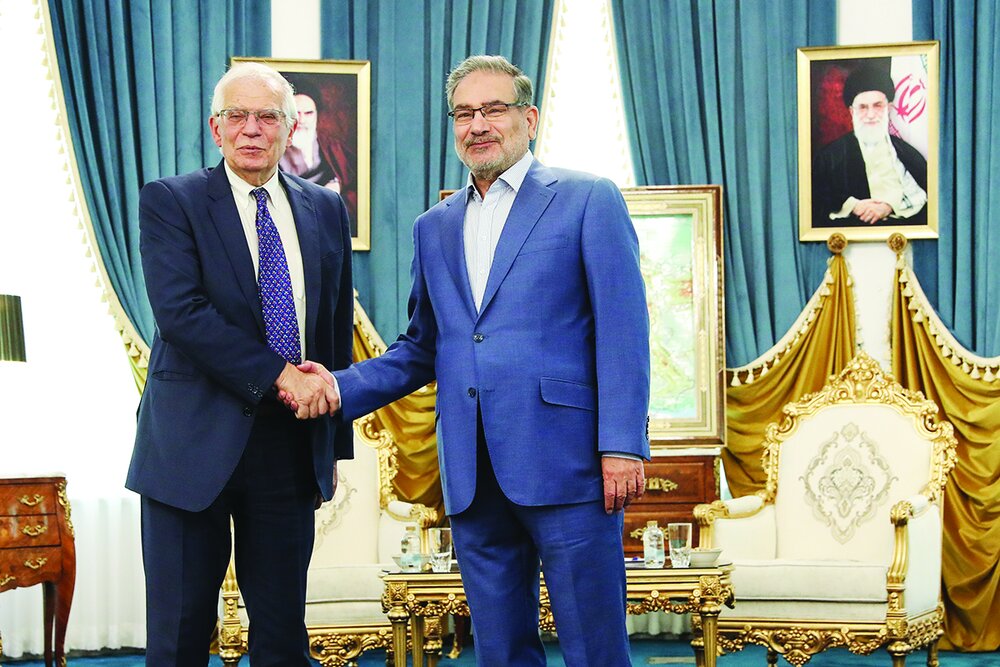Iran will go ahead with remedial nuclear measures until the West stops illegal moves: Shamkhani

TEHRAN - Iran's senior security official has criticized Europe's passivity and the United States’ lack of commitment to the terms of the 2015 nuclear agreement, saying Tehran will continue its remedial nuclear measures until the West abandons its “illegal practices”.
Ali Shamkhani, the secretary of Iran's Supreme National Security Council (SNSC), made the remarks in a meeting with Josep Borrell, the European Union's foreign policy and security chief, in Tehran late on Saturday.
“Iran's remedial measures in the nuclear sector are merely a legal and rational reaction to U.S. unilateralism and Europe's inaction and will continue as long as the West's illegal practices persist,” Shamkhani asserted.
The Iranian nation has lost faith in the West and Washington as a result of the U.S. illegitimate withdrawal from the nuclear agreement, officially known as the Joint Comprehensive Plan of Action (JCPOA), Shamkhani added.
One year after former U.S. president Donald Trump order U.S. withdrawal from the JCPOA Iran remained fully loyal to the agreement. However, since the European parties to the pact failed to compensate Iran for the sanctions Iran started to gradually lift bans on its nuclear activities.
Under the JCPOA, Iran agreed to put limits on its nuclear activities in exchange for termination of economic and financial sanctions.
Shamkhani went on to say that “Iran has never left the negotiating table and we are still looking for a strong, lasting and reliable agreement.”
In a joint press conference on Saturday, Iran’s Foreign Minister Hossein Amir Abdollahian and Borrell announced that talks will resume soon to revive the JCPOA.
“We are ready to resume the Vienna talks within the next days,” Amir Abdollahian said.
The announcement was made prior to Borrell’s meeting with Shamkhani.
Shamkhani noted that Iran's only goal in participating in the Vienna talks were only intended to lift illegal sanctions so that Iran could fully reap the economic benefits of the JCPOA.
"Iran does not favor an agreement that fails to meet the two above-mentioned principles in securing a reliable guarantee from the U.S. and Europe," he pointed out.
He underscored that the contradictory conducts of the U.S. and its continued use of threats and sanctions prevented the Vienna participants from reaching a final consensus on restoration the JCPOA.
The participants in the Vienna talks, which started in April 2021, were Iran and the other remaining parties to the JCPOA – Russia, China and the three European countries of Germany, France and Britain, known as E3. Iran did not negotiate with the U.S. directly during the Vienna talks.
"The language of force cannot be used in addressing a country that has overcome the most difficult conditions of sanctions with vigorous resistance and the sympathy and support of its people," the SNSC secretary remarked.
After quitting the JCPOA, Trump declared the “maximum pressure” campaign against Iran. Trump himself called sanctions against Iran the strongest in history.
For his part, the senior EU diplomat said a resurrection of the JCPOA can be seen as a major security success in the international system under the current circumstances in the world.
Borrell attacked Trump for withdrawing the United States from the multilateral agreement and asserted that in order to establish a favorable final accord, all parties to the JCPOA must look to the future.
He noted that the Joe Biden administration is eager to negotiate a deal to restore the JCPOA, citing his conversations with U.S. officials before departing for Tehran.
Before his travel to Tehran late on Friday, Borrell and his deputy Enrique Mora had a working dinner with Robert Malley, the United States special envoy for Iran who leads the U.S. team in negotiations with Iran.
After his meeting with Shamkhani, Borrell wrote, “Important meeting with the secretary of the Supreme National Security Council of #Iran, Ali Shamkhani, on how to bring the #JCPOA back on track.”
Leave a Comment